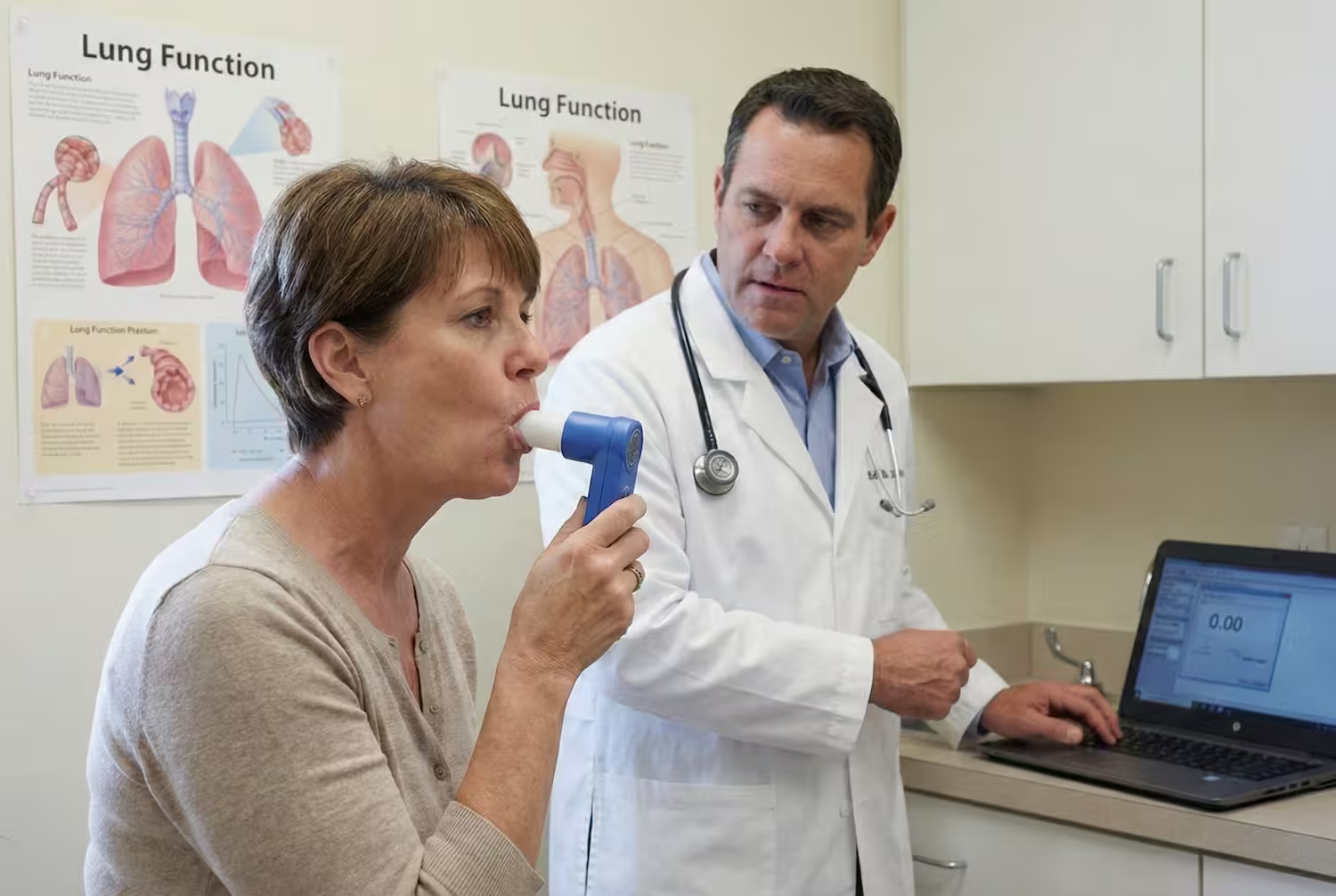
Bronchiectasis can significantly impact an individual's quality of life. While typically not a life-threatening health condition, it will require proper management to prevent further complications of bronchiectasis from developing.
In this article, we will delve into the details of bronchiectasis, including its symptoms, diagnosis, causes, and treatment options. We’ll also discuss how the virtual services offered by Carda Health can be a valuable resource for the management of bronchiectasis.
What Is Bronchiectasis?
Bronchiectasis is a chronic lung condition characterized by the dilation and inflammation of the bronchi, the airways responsible for transporting air to the lungs. This condition disrupts the normal functioning of the respiratory system, leading to the accumulation of clear mucus and making the airways more susceptible to frequent lung infections.
As a result, those with bronchiectasis experience a range of symptoms that can significantly impact their daily lives.
What Are the Symptoms of Bronchiectasis?
Bronchiectasis manifests with a range of symptoms that vary in severity among individuals. The most common symptoms of bronchiectasis include the following:
Persistent Cough
One of the hallmark symptoms of bronchiectasis is a persistent cough that produces sputum, commonly referred to as mucus, and phlegm, a thicker type of sputum. This chronic cough is a result of the ongoing inflammation and irritation of the bronchi.
Waking up in the morning or engaging in physical activity when the airways are further stimulated can result in flare-ups that worsen the cough. The production of excessive mucus contributes to the persistence of the cough and can be distressing for individuals with bronchiectasis.
Shortness of Breath
Shortness of breath is another prevalent symptom among individuals with bronchiectasis. The inflammation and dilation of the bronchi restrict the smooth flow of air into the lungs, leading to difficulty breathing. Even with minimal exertion or physical activity, individuals may experience a sensation of breathlessness and find it challenging to catch their breath.
Recurrent Lung Infections
Frequent and recurring lung infections are common in individuals with bronchiectasis. These infections, such as pneumonia and bronchitis, occur due to the impaired clearance of mucus from the airways and the compromised immune response. The presence of recurrent infections further exacerbates the symptoms of bronchiectasis and can lead to periods of worsening symptoms and severe lung damage.
Coughing Up Blood
In severe cases of bronchiectasis, coughing up blood, medically referred to as hemoptysis, may occur. Hemoptysis is a concerning symptom that requires immediate medical attention. It indicates significant damage to the airway walls and blood vessels within the respiratory system.
Chest Pain
Some individuals with bronchiectasis may experience chest pain or discomfort due to the ongoing lung inflammation. The inflammation irritates the sensitive nerve endings in the lungs and surrounding tissues, leading to chest pain. This discomfort can vary in intensity and may be more prominent during exacerbations or periods of increased inflammation.
Weight Loss and Fatigue
Constant coughing, shortness of breath, and recurrent infections can result in weight loss and persistent fatigue. The body's energy reserves are depleted as it continuously fights against the respiratory challenges posed by bronchiectasis. As a result, individuals may experience unintentional weight loss and feel fatigued even with minimal physical exertion.
How Is Bronchiectasis Diagnosed?
The diagnosis of bronchiectasis involves a comprehensive evaluation of the individual's medical history, symptoms, and diagnostic tests.
Healthcare providers employ various methods to diagnose bronchiectasis, including:
- Medical history and physical examination: A detailed discussion of the individual's symptoms, medical background, and potential exposure to risk factors associated with bronchiectasis
- Laboratory testing: The healthcare provider gathers valuable information that aids in assessing the likelihood of bronchiectasis and guiding further diagnostic investigations. These examinations are likely to include blood tests, genetic testing, and more.
- Chest X-ray: A chest X-ray is often performed as part of the diagnostic process.
- High-resolution computed tomography (HRCT) scan: Unlike a typical CT scan, an HRCT scan produces detailed cross-sectional images of the lungs, allowing healthcare providers to visualize the bronchial abnormalities characteristic of bronchiectasis.
- Lung function tests: Lung function tests, such as spirometry and lung volume measurement, are crucial in assessing lung capacity and airflow.
- Sputum analysis: Analyzing sputum samples plays a vital role in diagnosing bronchiectasis, particularly in identifying specific bacteria or fungi responsible for recurrent lung infections.
- Bronchoscopy: In certain cases, a bronchoscopy may be recommended to further evaluate the airways and collect samples for testing.
What Causes Bronchiectasis?
There are many potential underlying conditions that can result in bronchiectasis. Here are a few of the most common ones:
Cystic Fibrosis
Cystic fibrosis, a congenital genetic disorder, is one of the most common causes of bronchiectasis. It results in the production of thick, sticky mucus that clogs the airways and leads to chronic infections. Individuals with cystic fibrosis are encouraged to receive vaccinations to prevent respiratory infections and further complications.
Primary Ciliary Dyskinesia
Primary ciliary dyskinesia is another inherited disorder that affects the cilia, tiny hair-like structures that help move mucus out of the airways. Impaired ciliary function leads to mucus build-up and recurrent infections, which can contribute to the development of bronchiectasis.
Early diagnosis and treatment, including airway clearance techniques and appropriate vaccinations, are crucial in managing this condition.
Immunodeficiency Disorders
Certain immune system disorders can increase the risk of bronchiectasis by making individuals more susceptible to recurrent lung infections. Immunodeficiency can impair the body's ability to fight off infections, leading to chronic inflammation and damage to the airways.
Vaccinations are particularly important for individuals with immunodeficiency disorders to protect against preventable respiratory infections.
Post-Infectious Bronchiectasis
Severe respiratory infections, such as pneumonia or whooping cough, can cause long-term damage to the airways, making them another common underlying cause of bronchiectasis.
These infections can result in persistent inflammation, scarring, and structural changes in the sinus and bronchial walls. Effective management of respiratory infections, timely treatment, and appropriate vaccinations can help reduce the risk of post-infectious bronchiectasis.
How Is Bronchiectasis Treated?
Bronchiectasis management focuses on reducing symptoms, preventing complications, and improving overall lung health.
The treatment of bronchiectasis typically involves a multidisciplinary approach that incorporates the following:
Medications
Various medications are used to manage bronchiectasis. These may include:
- Bronchodilators: Bronchodilators help relax the airway muscles and improve airflow, easing breathing difficulties.
- Expectorants: Expectorant medications help loosen mucus, making it easier to cough up and clear from the airways.
- Antibiotics: Antibiotics are prescribed to treat lung infections and prevent exacerbations. The specific choice of antibiotics depends on the causative organisms identified through sputum cultures or other tests.
- Anti-inflammatory drugs: In some cases, anti-inflammatory medications may be prescribed to reduce airway inflammation and control symptoms.
Pulmonary Rehabilitation
Pulmonary rehabilitation programs like those offered at Carda Health are highly beneficial for individuals with bronchiectasis. Our programs are designed to support lung function, enhance physical fitness, and support overall quality of life.
Our programs incorporate a combination of exercise, breathing techniques, and education, empowering individuals to actively manage their condition. Physical therapy plays a significant role in our programs, helping individuals strengthen their respiratory muscles, improve endurance, and optimize lung capacity.
Surgery
In severe cases of bronchiectasis where conservative treatments are insufficient, surgical intervention may be considered. Surgery aims to remove the damaged lung tissue and improve lung function. This approach is typically reserved for individuals with localized bronchiectasis or those with significant lung damage.
Surgery can help alleviate symptoms, reduce the frequency of infections, and improve overall respiratory function. However, it is important to note that surgery is usually considered as a last resort when other treatment options have been exhausted.
The Bottom Line
Bronchiectasis is a chronic lung condition characterized by the widening of the bronchi and persistent respiratory symptoms. Early diagnosis and appropriate treatment are vital for managing symptoms, preventing complications, and maintaining a good quality of life.
If you or someone you know is affected by bronchiectasis, consider exploring the virtual services offered by Carda Health. Our healthcare professionals can provide expert guidance, support, and personalized care to anyone requiring cardiopulmonary care on their journey to recovery.
Remember, timely intervention and effective management can make a significant difference in living a fulfilling life with bronchiectasis. Contact us today to find out how we can help.
Sources:
Bronchiectasis | American Lung Association
Sputum Analysis | NCBI Bookshelf
Bronchitis and Pneumonia | PMC
The Diagnosis and Treatment of Hemoptysis | PMC
High-Resolution Ct of the Lungs: Indications and Diagnosis | NCBI Bookshelf
Bronchoscopy | Johns Hopkins Medicine
What Is Cystic Fibrosis? | NHLBI
Primary Ciliary Dyskinesia (PCD) | American Lung Association

.avif)






